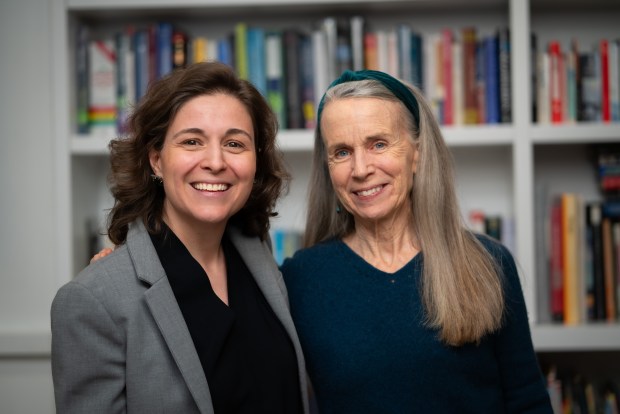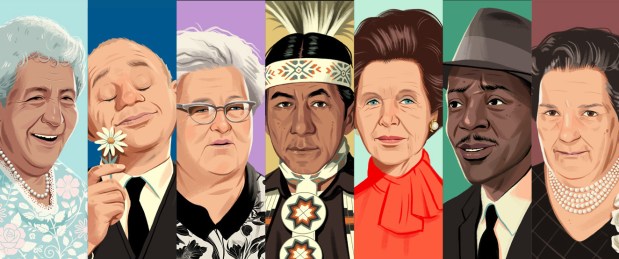Have you ever finished a Studs Terkel book and wondered, whatever happened to the people he interviewed?
A seven-episode podcast series called “Division Street Revisited,” from executive producers and veteran journalists Melissa Harris and Mary Schmich, shares the unfinished stories of seven people Terkel spoke with for his 1967 book, “Division Street: America,” and what their stories say about the hopes and fears of everyday Americans.
The first episode, “Myra Alexander: Never Too Old to Be Free,” aired Jan. 27 on WBEZ 91.5 FM. The remaining six episodes will air at 6:30 p.m. Mondays on WBEZ and can also be found on major podcast sites, distributed by media organization PRX.
Its title a nod to the actual street on Chicago’s North Side and the nation’s dogged social, cultural, and racial divides, “Division Street: America” was the second of many books written by Terkel. Considering Chicago to be a microcosm of America, he found 71 individuals who comprised a microcosm of Chicago. He turned on his tape recorder, asked stimulating questions in an unassuming and conversational style, and let the people speak. The book became a foundational work of oral history and made Terkel, then in his 50s, a household name.
Melissa Harris, who now runs a marketing firm, first encountered Terkel’s book in 2009 when she arrived in Chicago to write for the Tribune. Eager to learn everything she could about her new home, she asked colleague Rick Kogan what she should read. “Division Street: America” was one of the 10 books he recommended. “The book swallowed me,” Harris recalled. “I wanted to know what happened to these people, what happened to their children, but nearly all the persons were under pseudonyms.”
She began to decode the identities of Terkel’s interviewees and hoped to write a piece about the book on the 50th anniversary of its publication in 2017. “But life got in the way,” she said, and the project was shelved.
Enter then-Tribune colleague Mary Schmich. In 2021, Schmich (who retired from the Tribune in June of that year) learned that Terkel’s original tape-recorded interviews, including for “Division Street: America,” would at last be accessible. The Chicago History Museum was working with the Library of Congress to digitize them. Schmich and Harris wondered if bringing forward some of the stories in the book, using snippets of the original tape-recorded interviews, might be best accomplished in podcast form. “But we were newspaper people,” Schmich said. “We knew nothing about making a podcast.” They turned to a mutual colleague, Mark Jacob, an author and former Tribune editor, and assembled a team that included podcast producer Bill Healy, and completed a couple of sample podcasts as they searched for funding. Finally, with a National Endowment for the Humanities grant in hand, production of “Division Street Revisited” began in summer 2023.
Of the 71 interviewees in “Division Street: America,” Harris and Schmich selected seven people they felt represented larger issues in American life. They included a Black woman activist, a closeted gay actor, an Appalachian mother of 15 and a wealthy society woman. The objective, Schmich said, was “to make the stories very personal and to also show the sweep of the country.”
Since all seven original interviewees had died, the duo conducted online research and made cold calls to find friends and relations. With the descendants identified and the interviews begun, Harris and Schmich discovered just how little some of them actually knew about their family history, but also how moved they were to learn it. “We played the original taped interviews for the families,” Harris said, “and it was the first time they were hearing these voices in nearly 50 years. It was a powerful experience.”
As an example, the Myra Alexander story, the subject of the first episode, is the 20th century African American urban experience in miniature. Working as a custodian in the Chicago Public School system, Alexander (Lois Arthur is her pseudonym in the book) was an ardent activist for civil rights. She met Terkel when they were both en route to Washington, D.C., for the August 1963 March on Washington. Alexander’s commitment to social justice eventually rubbed off on her descendants. Their abiding hope, along with the acknowledgment that the revolution must continue, are testaments to Alexander’s tenacity. “Their lives,” noted Schmich, who wrote and narrates the episodes, “give us perspective on our lives.”
Forthcoming episodes include the life of Leon Beverly, whose story also speaks to the African American experience. Part of the first wave of the Great Migration, Beverly was a packinghouse worker and union leader. He was also a piano player who believed just as passionately in the power of music as in the power of labor organizing to lift the souls and spirits of people. Schmich noted how much music mattered to all of the people interviewed, “how it ran all through their lives.” Another interviewee with a passion for the arts was actor Bill Koza, whose experiences as a gay man in a society hostile to homosexuality led to a profound loneliness but also to a desire to express his emotions through the theater.
Native American Ben Bearskin’s story is particularly relevant today. As he told Terkel, he and his ancestors were the ones “at home, whereas everyone else came here from somewhere else.” Although Bearskin helped many Native Americans adjust to life in Chicago, all five of his children ultimately returned to the reservation.

To coincide with the launch of “Division Street Revisited,” the New Press published a new edition of “Division Street: America,” with a foreword by Schmich.
For the red-stockinged, cigar-chomping, once-blacklisted, witty, and Pulitzer Prize-winning American icon Studs Terkel, the story was everything. And the best people to tell the story were not the politicians but the everyday citizen. The same credo drives “Division Street Revisited.”
“These seemingly small, individual stories are telling much bigger stories — about women, race, LGBTQ rights, immigration,” Schmich said. “Taken together, they create a portrait of a whole century of American life, with Chicago at its beating heart.”
Robert Marovich is a freelance writer.



